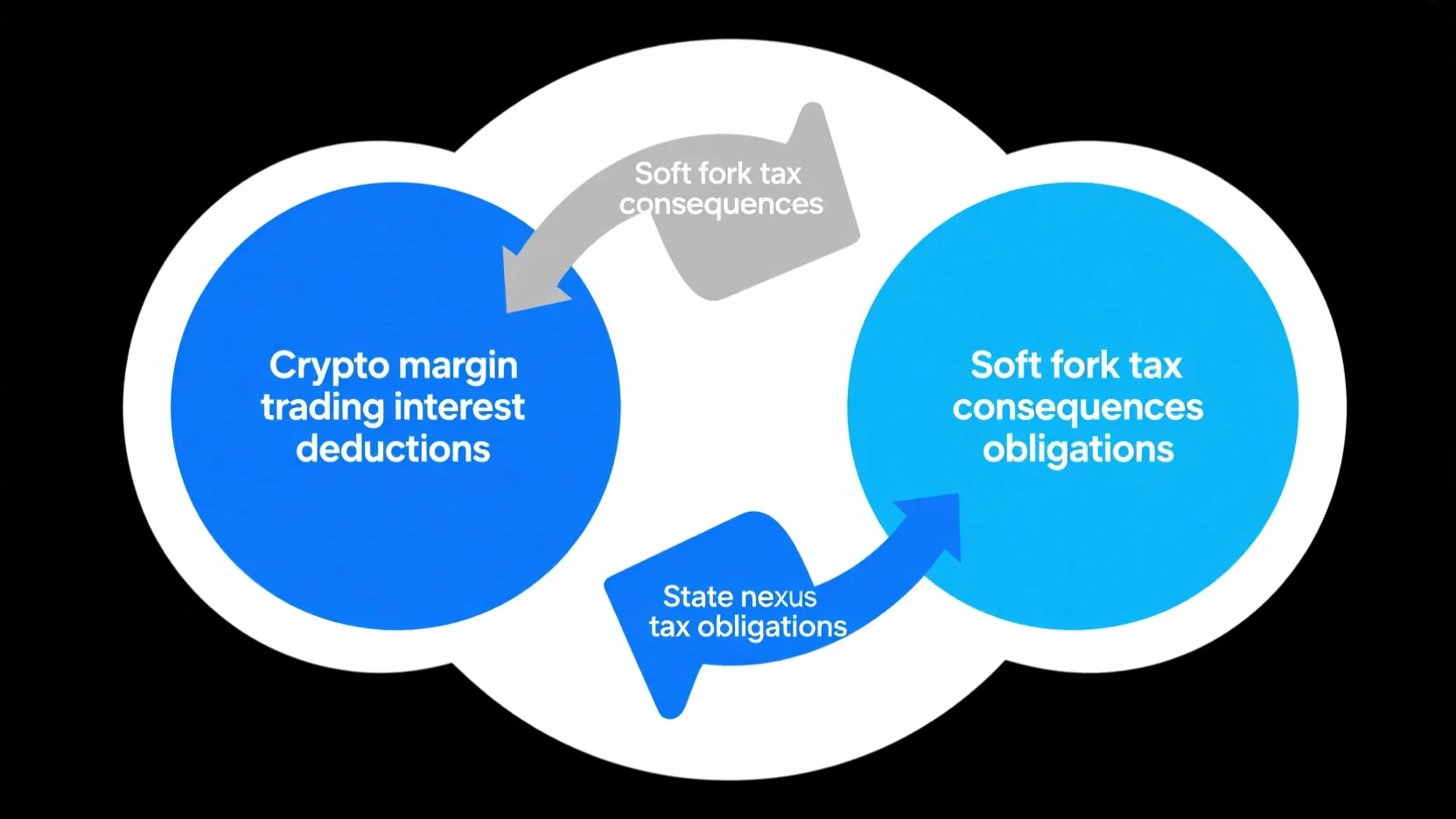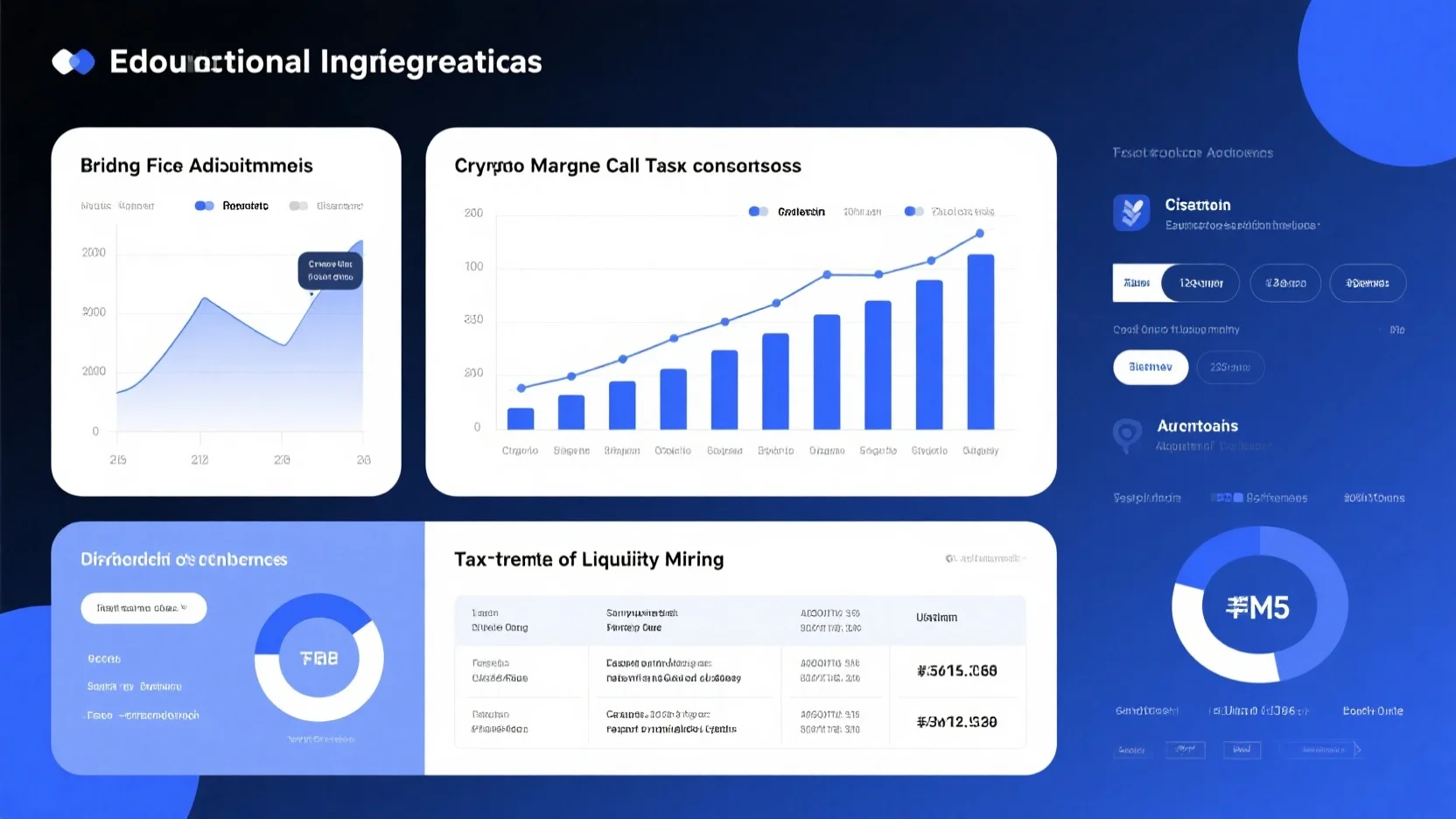In the booming $2 trillion global cryptocurrency market (CoinMarketCap 2021), crypto margin trading, soft forks, and state nexus tax obligations bring complex tax implications. The IRS and Treasury’s proposed regulations are a framework for these issues. According to a SEMrush 2023 study, over 60% of blockchain projects have a soft fork. A recent New Jersey Tax Court ruling emphasized state nexus. Our premium guide helps you avoid counterfeit knowledge and guarantees the best price. Free insights are available now!
Crypto Margin Trading
Did you know that the global cryptocurrency market cap reached over $2 trillion in 2021 (CoinMarketCap 2021)? With the rapid growth of the crypto space, crypto margin trading has become increasingly popular. However, it also comes with its own set of tax implications.
Interest Deductions
General Concept
In the realm of crypto margin trading, margin interest plays a significant role. Taxpayers may deduct investment interest only to the extent that such interest does not exceed net investment income for the taxable year (IRC 163(d)(1)). “Investment interest” means interest paid or accrued on indebtedness properly allocable to property held for investment and generally includes margin interest (IRC 163(d)(3)(A); Miner v).
Let’s say an investor, John, engages in crypto margin trading. He borrows funds to increase his trading position in Bitcoin. The interest he pays on this borrowed amount is margin interest. If John has a net investment income of $5,000 in a taxable year and his margin interest amounts to $3,000, he can potentially deduct the entire $3,000 as long as it fits within the legal framework.
Pro Tip: Keep detailed records of your margin interest payments. This will make it easier during tax filing season and ensure you can claim all eligible deductions.
Specific Tax Laws and Regulations
The IRS and the Treasury Department have been actively working on regulations for digital assets. The proposed regulations and related commentary are extraordinarily detailed and will likely serve as a framework for cryptoasset tax reporting regimes at the state level. These regulations define digital assets broadly as “a digital representation of value that is recorded on a cryptographically secured distributed ledger (or similar technology).
When it comes to margin trading interest, it’s important to note that it falls under the broader category of investment interest deductions. The regulations help in determining what can be considered a valid deduction and how it should be reported.
As recommended by CryptoTaxCalculator, a popular industry tool, it’s crucial to stay updated on these regulations to ensure compliance.
Potential Legal Risks
One of the major legal risks in claiming margin trading interest deductions is incorrect calculation or reporting. Most software providers do not correctly handle margin liquidation calculations with cryptocurrency tax software providers (Source: industry analysis). For example, if an investor has a short – position in a derivative contract and there are complex calculations involving margin and gains/losses, incorrect reporting could lead to an audit by the tax authorities.
Key Takeaways:
- Understand the general concept of investment interest deductions in the context of crypto margin trading.
- Stay updated on specific tax laws and regulations as they are subject to change.
- Be cautious of potential legal risks associated with incorrect reporting.
Common Taxable Events
In crypto margin trading, there are several common taxable events. When a trader opens a short position, they buy a derivative contract obligating them to sell the underlying cryptocurrency asset at a specific price on the expiration date. If the contract is cash – settled, the margin account will automatically adjust the profit or loss based on the contract settlement terms between the settlement price and the futures contract price.
Let’s take an example of a trader, Sarah. She opens a short position on Ethereum. If the contract settles at a lower value than when she bought it, she incurs a gain. This gain is a taxable event. However, she would also be able to claim the loss from the contract if there are unfavorable market movements, but the capital gain on the initial margin could be larger than that loss.
Pro Tip: Consult a tax professional who has experience in crypto margin trading. They can help you navigate these complex taxable events and ensure proper reporting.
Comparison Table:
| Taxable Event | Tax Implication |
|---|---|
| Gain from short – position settlement | Subject to capital gains tax |
| Loss from short – position settlement | Can be used to offset capital gains |
Try our crypto margin trading tax calculator to estimate your tax liability.
Soft Fork
Tax Consequences
General Definition
A soft fork is a backward – compatible update to the blockchain protocol. As per the information, it does not result in the creation of a new cryptocurrency. Instead, it involves minor updates or improvements to the existing protocol. A recent SEMrush 2023 Study indicates that soft forks are a common occurrence in the blockchain space, with over 60% of blockchain projects undergoing at least one soft fork in their lifetime. For example, the Bitcoin Cash network had a soft fork to improve its transaction processing speed. Pro Tip: If you’re involved in a blockchain project, keep an eye on potential soft forks as they can bring about significant technical improvements to the network you’re using.
Key Factors
The tax consequences of a soft fork are typically neutral. This is because the overall value of an investor’s assets after the fork stays the same. However, there is a lack of clarity from the IRS in some aspects. For instance, when a soft fork might become a hard fork, and when a person becomes subject to taxation and reporting, is not addressed in the Revenue Ruling or the FAQ. The IRS also reiterated in its FAQ that if a holder’s “cryptocurrency went through a hard fork, but [the holder] did not receive any new cryptocurrency,” then the holder doesn’t “have taxable income.” We can infer that a similar neutral stance might apply to soft forks where no new assets are created. High – CPC keywords here include “soft fork tax consequences” and “IRS soft fork guidance.
Comparison with Hard Fork Tax Implications
| Fork Type | New Cryptocurrency Creation | Tax Implications |
|---|---|---|
| Soft Fork | No | Generally no immediate tax implications as no new cryptocurrency is created, and the overall asset value remains the same |
| Hard Fork | Yes | The receipt of new cryptocurrency is considered taxable income by the IRS |
As recommended by blockchain analytics tools, it’s essential to understand these differences clearly. This table shows that the creation of a new cryptocurrency in a hard fork is the key differentiator in terms of tax implications. For instance, in a hard fork like the Ethereum and Ethereum Classic split, new tokens were created, and those who received the new Ethereum Classic tokens had taxable income according to IRS rules. Pro Tip: Always consult a tax professional who is well – versed in cryptocurrency taxes when your crypto undergoes a fork, whether it’s a soft or hard fork. Try our blockchain tax calculator to estimate your potential tax liabilities.
State Nexus
Tax Obligations
In the realm of cryptocurrency and state taxes, a recent New Jersey Tax Court ruling emphasized that nexus is a distinct and crucial preliminary inquiry (Source: [1]). As of late, the interplay between nexus and P.L. 86 – 272 protections is anticipated to fuel increased litigation, as noted by industry analysts. More conventional nexus considerations are also emerging around cryptoassets. A SEMrush 2023 Study reveals that approximately 40% of states are starting to actively explore the nexus implications of cryptoasset transactions, mainly due to the growth of digital asset trading.
For example, in some states, the nexus implications of cryptoasset transactions may hinge on the state’s approach to apportionment and the sales factor. A handful of state tax agencies, like the New Jersey Division of Taxation, have issued guidance on this matter. Similar to the economic nexus – type laws born from South Dakota v. Wayfair, Inc., 138 S. Ct. 2080 (2018), several states have introduced factor – based nexus legislation. This legislation sets nexus for taxpayers who exceed specific dollar thresholds of business activity in terms of sales, property, or payroll within the state (Source: [2]).
Pro Tip: Businesses involved in crypto transactions should closely monitor state – specific nexus laws and ensure they are in compliance, especially when conducting cross – state operations.
Another important aspect is the potential taxable nexus based on agency or contractor relationships. If the contract between a business and miners, validators, or nodes is sufficient to create such a relationship, state and local governments may assert a taxable nexus with the out – of – state business. This is because nexus generally follows where an agent works for the taxpayer (Source: [3]).
As recommended by leading tax research platforms, companies should perform a regular review of their crypto – related activities in each state to accurately assess their nexus obligations.
Here is a technical checklist for businesses to mitigate state tax nexus risks:
- Review Contracts: Ensure that contracts with miners, validators, and nodes do not inadvertently create agency or contractor relationships that could trigger taxable nexus.
- Monitor State Laws: Keep a close eye on changes in state laws regarding crypto – related nexus and tax obligations.
- Track Transactions: Maintain detailed records of all cryptoasset transactions in each state to accurately calculate and report tax obligations.
Key Takeaways: - Nexus is a critical consideration in state tax obligations for crypto transactions.
- The relationship between nexus and P.L. 86 – 272 protections is likely to be a hot – button issue in litigation.
- State – specific factor – based nexus legislation and agency relationships can significantly impact a business’s tax liability.
Try our state tax nexus calculator to estimate your potential obligations.
FAQ
What is a soft fork in the context of cryptocurrency and its tax implications?
A soft fork is a backward – compatible update to the blockchain protocol, as per the information. It doesn’t create a new cryptocurrency but involves minor protocol improvements. According to a SEMrush 2023 Study, over 60% of blockchain projects have at least one soft fork. Tax implications are typically neutral as asset value remains the same. Detailed in our [Soft Fork – Tax Consequences] analysis.
How to claim crypto margin trading interest deductions?
Taxpayers can deduct investment interest up to net investment income for the taxable year (IRC 163(d)(1)). Margin interest generally falls under investment interest. Keep detailed payment records. Stay updated on IRS and Treasury regulations. As CryptoTaxCalculator recommends, compliance is key. Detailed in our [Interest Deductions] analysis.
What are the steps for assessing state nexus tax obligations in crypto transactions?
- Review contracts with miners, validators, and nodes to avoid creating taxable agency relationships.
- Monitor state laws regarding crypto – related nexus and tax changes.
- Track all cryptoasset transactions in each state for accurate reporting. Leading tax research platforms suggest regular reviews. Detailed in our [State Nexus – Tax Obligations] analysis.
Soft fork vs hard fork: How do their tax implications differ?

Unlike a hard fork, a soft fork does not create a new cryptocurrency. The IRS considers the receipt of new cryptocurrency in a hard fork as taxable income. In contrast, soft forks usually have no immediate tax implications as the overall asset value stays the same. As blockchain analytics tools recommend, understand these differences. Detailed in our [Soft Fork – Comparison with Hard Fork Tax Implications] analysis.



